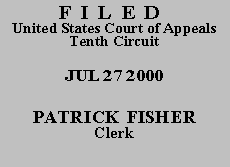 UNITED STATES COURT OF APPEALS
UNITED STATES COURT OF APPEALS
 UNITED STATES COURT OF APPEALS
UNITED STATES COURT OF APPEALS
TENTH CIRCUIT
| JOSE FRANCISCOGONZALES, | |
| v. | No. 00-7024 |
| TWYLA SNIDER, Warden; OKLAHOMA DEPARTMENT OF CORRECTIONS; PEOPLE OF THE STATE OF OKLAHOMA; ATTORNEY GENERAL OF THE STATE OF OKLAHOMA, | (D.C. No. 98-CV-433-S) |
ORDER AND JUDGMENT(*)
Before BALDOCK, HENRY, and LUCERO, Circuit Judges.(**)
Petitioner Jose Francisco Gonzales, proceeding pro se, filed a petition for a writ of habeas corpus pursuant to 28 U.S.C. § 2254. The district court denied the petition.(1) The district court did not address the issue of whether Petitioner is entitled to a certificate of appealability; therefore, we deem the certificate of appealability denied. See General Order of October 1, 1996. Petitioner applies for a certificate of appealability from this court. Because Petitioner has failed to make a substantial showing of the denial of a constitutional right, see 28 U.S.C. § 2253(c)(2), we deny Petitioner's application for a certificate of appealability and dismiss his appeal.
Petitioner pled guilty in Oklahoma state district court to trafficking in marijuana and received a sentence of fifteen years imprisonment. Petitioner did not appeal or file a timely motion to withdraw his plea. He filed a petition for post-conviction relief in state district court, which the court denied. Gonzales v. State, No. CF 97-65 (Murray County Dist. Ct. Mar. 25, 1998). Petitioner appealed. The Oklahoma Court of Criminal Appeals affirmed, finding Petitioner's counsel not constitutionally ineffective and finding his remaining claims procedurally barred. Gonzales v. State, No. PC 98-470, slip op. at 3-4 (Okla. Ct. Crim. App. June 4, 1998).
Petitioner filed a § 2254 petition in federal district court raising the following four claims: (1) the state district court failed to enter findings of fact and conclusions of law to support its denial of Petitioner's application for state post-conviction relief, (2) trial counsel provided ineffective assistance, (3) the state district court failed to establish the factual basis of the guilty plea, and (4) the state district court failed to fully advise Petitioner about the consequencesincluding deportationof his guilty plea.
A magistrate judge recommended denying the petition on all claims. The magistrate judge noted that the first claim raises an issue of state law which is not cognizable in a federal habeas action. He observed that the second claim, ineffective assistance of counsel, should fail because the state district court's conclusion that counsel satisfied the standards of Strickland v. Washington, 466 U.S. 668 (1984), was not contrary to or an unreasonable application of federal law under 28 U.S.C. § 2254(d)(1). Petitioner did not raise his third or fourth claims, regarding the state district court's lack of findings and Petitioner's awareness of the consequences of his guilty plea, in state court either on appeal or in a timely motion to withdraw the plea, and failed to make a showing of cause and prejudice or a fundamental miscarriage of justice. The magistrate judge, therefore, recommended finding the claims procedurally barred.
Petitioner filed objections to the magistrate judge's findings and recommendations. The district court denied the objections and adopted the magistrate judge's findings and recommendations. Petitioner raises the same claims on appeal as he did in the district court.
A Petitioner may appeal the denial of a § 2254 petition only "if a circuit judge or justice" issues a certificate of appealability. 28 U.S.C. § 2253(c)(1)(A). A certificate of appealability "may issue . . . only if the applicant has made a substantial showing of the denial of a constitutional right." Id. at § 2253(c)(2). We have thoroughly reviewed the record on appeal, Petitioner's brief, the magistrate judge's findings and recommendations, and the district court's order. We deny Petitioner's application for a certificate of appealability for substantially the reasons set forth in the magistrate judge's findings and recommendations.
MOTION DENIED; APPEAL DISMISSED.
Entered for the Court,
Bobby R. Baldock
Circuit Judge
*. This order and judgment is not binding precedent, except under the doctrines of law of the case, res judicata, and collateral estoppel. The court generally disfavors the citation of orders and judgments; nevertheless, an order and judgment may be cited under the terms and conditions of 10th Cir. R. 36.3.
**. After examining the briefs and appellate record, the panel has determined unanimously that oral argument would not materially assist the determination of this appeal. See Fed. R. App. P. 34(a)(2)(c); 10th Cir. R. 34.1(G). The case is therefore ordered submitted without oral argument.
1. Petitioner has paid the appellate filing fee in full. Therefore, we need not consider his status to file in forma pauperis.